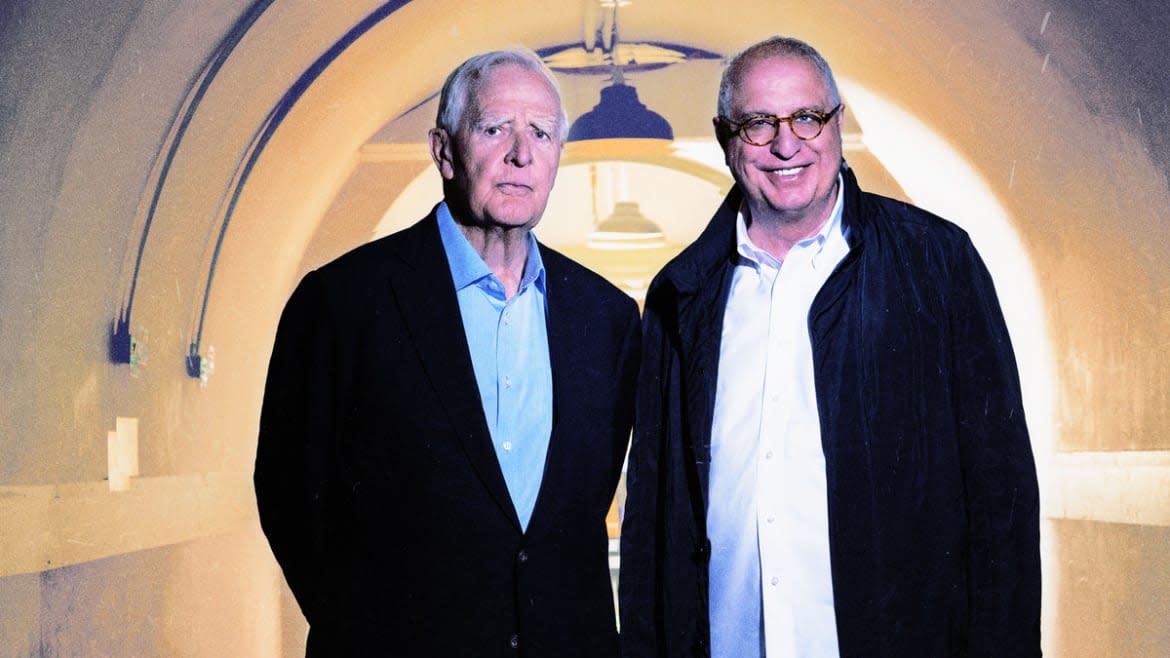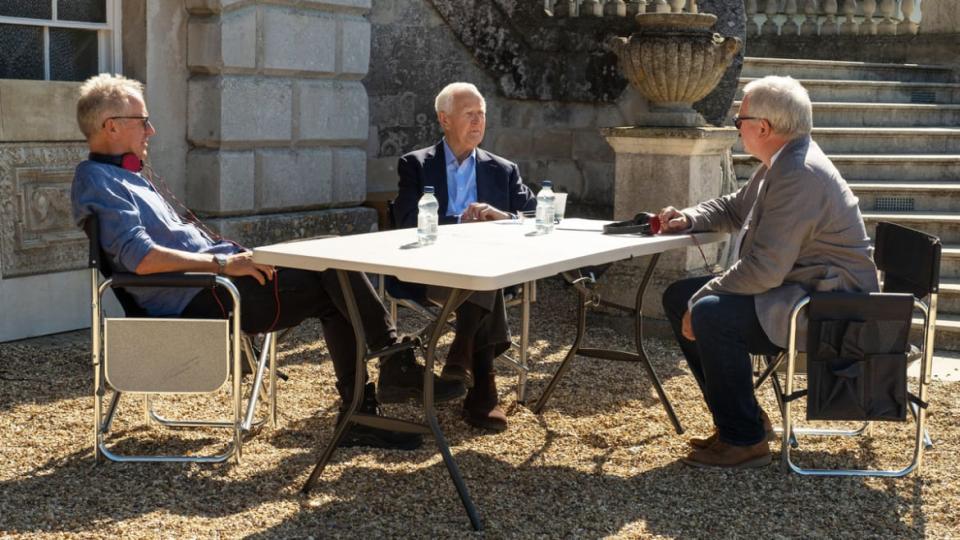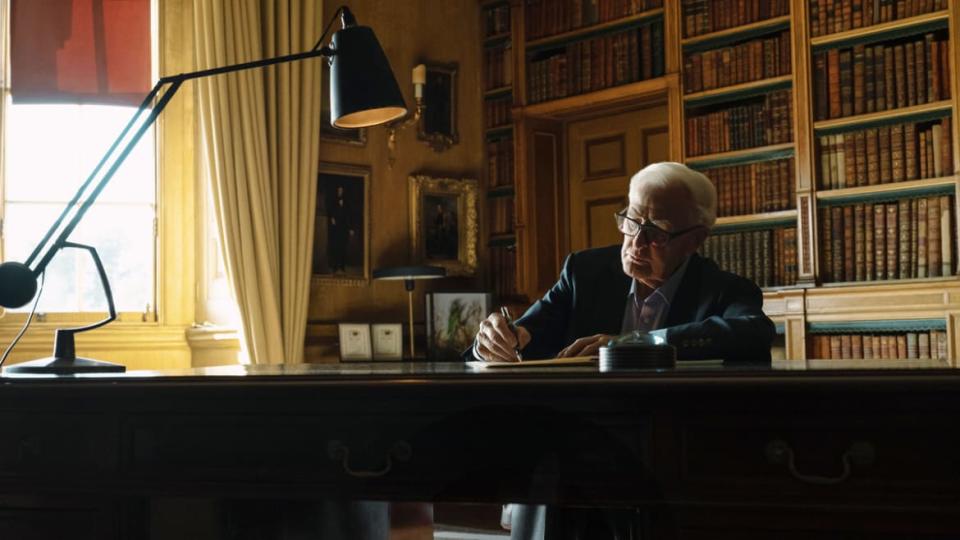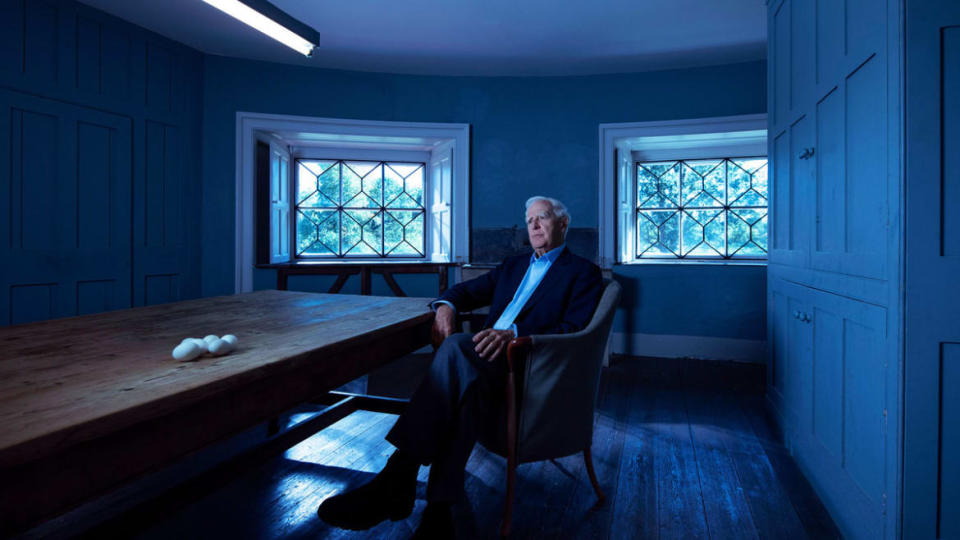John le Carré, the World’s Greatest Spy Writer, Gets His Spotlight

- Oops!Something went wrong.Please try again later.
- Oops!Something went wrong.Please try again later.
No one knew spies like David John Moore Cornwell, aka John le Carré, the acclaimed novelist whose tales of Cold War espionage were infused with authenticity and dripped with despair. The Spy Who Came in from the Cold, Tinker Tailor Soldier Spy, Smiley’s People, The Night Manager, and A Perfect Spy solidified his standing as the genre’s preeminent artist, operating as a one-man corrective to Ian Fleming (and his popular James Bond fantasies) by immersing readers in clandestine worlds where the shadows were so thick you could practically choke on them. He was the master of duplicity, and in Errol Morris’ The Pigeon Tunnel—energized by the last on-camera interview with the author, who passed away in 2020 at the age of 89—he pries into and lays bare his life and career, along the way tracing the oh-so-thin line separating fiction and reality, truth and lies, and confession and cross-examination.
Le Carré was born in 1931 to a mother who abandoned him at five and a father, Ronald“Ronnie” Cornwell, whom his son describes as a “confidence trickster” who never had a dime and loved the thrill of the scam. As he explains in The Pigeon Tunnel (currently screening at the New York Film Festival, and premiering in theaters and on Apple TV+ on Oct. 20), his was an exciting and romantic adolescence spent as a member of his dad’s conmen troupe, and it continued once he was sent to a boarding school where he did his best to fit in but nonetheless felt like an outsider. Whether participating in Ronnie’s ruses (which kept them financially afloat) or hobnobbing with upper-crust preppies, le Carré was working literally and/or figuratively undercover, and the particular nature of his upbringing—abandoned by his mom; raised in the UK’s elite educational system; and a good boy who was additionally bad—made him a prime candidate for the country’s secret service, which soon recruited him.
The Pigeon Tunnel begins with le Carré remarking that any interview is a “performance art” interrogation in which the interrogator is also in the crosshairs, and that during his time in the army, his own interrogations hinged on “establishing…dependence on the interrogator.” Though this suggests a dual inquiry to come, Morris is (per tradition) audibly heard questioning his subject throughout the film but does not come under great scrutiny. Instead, the focus is squarely on le Carré. Following two rather unadventurous stints as an enigmatic operative for Her Majesty, he chose to fill in the blanks of his service with make-believe yarns about the vocation. Debuting in 1963, The Spy Who Came in from the Cold couldn’t have arrived at a better time, defining and encapsulating the desolate (if not outright fatalistic) mood of the geopolitical era, and turning le Carré into an instant sensation—a status he’d maintain for decades courtesy of subsequent best-sellers about cat-and-mouse spy games.
Morris shoots le Carré with canted angles and in manor-house rooms filled with mirrors, and he employs split-screens that juxtapose the writer with clips from film adaptations of his work, as well as dramatic recreations that echo the unreality of le Carré’s dramas. The novelist repeatedly discusses the links between his experiences and the yarns he spun, the clearest of which are found in 1986’s semi-autobiographical A Perfect Spy, and Morris plays with that duality (“the imprint of personality”) while having le Carré expound upon it, and the ways in which it’s fundamental to being a spy. The intelligence agent’s “self-imposed schizophrenia” is something about which he is intensely familiar, as is the allure it holds—a topic that springs forth from an extended conversation about Kim Philby, the notorious British spy who defected to the Soviet Union after outing himself as a double agent.

The Pigeon Tunnel takes its title from le Carré’s 2016 memoir and was the working moniker for most of his books, and tunnels and cages—and the victimization, sorrow, and loneliness they beget—are recurring elements of Morris’ documentary. However, despite its many flourishes (including newspaper headlines and rare archival video clips), the documentary remains fixated on le Carré, who speaks with the eloquence one might expect (as when he describes the appeal of spy-dom as “voluptuous”) and who persuasively contends that he’s now too old, content, and comfortable in his own skin to continue deceiving the public (and himself). He’s a grand chronicler of his own biography, and expertly goaded on by Morris, whose queries challenge present and past statements and compel further elaboration and contemplation.

Betrayal proves to be The Pigeon Tunnel’s running theme, and its roots stretch back to le Carré’s relationship with Ronnie, a grand and beloved charlatan who didn’t care for the truth and chased the ecstasy of pulling off a well-planned fraud. Le Carré’s feelings about his father are naturally complicated, especially given that Ronnie eventually tried to make him a mark, and the author discusses this state of affairs with cool analytical astuteness. His approach to himself is no different than his attitude toward writing, which he dubs “an attempt at self-knowledge,” and which the film cannily casts as its own kindred act of subterfuge—one in which people create alternate guises for themselves and others, play tricks on their targets, and intertwine the real and the unreal in a manner that’s difficult to parse.

Le Carré and Morris are the only voices heard in The Pigeon Tunnel, and that’s apt for a saga about honest and devious (self-)invention. From discussing his own betrayals and regrets, to opining on the nobility and sad emptiness of the spy profession, le Carré comes across as the great storyteller readers have long known him to be, and Morris’ documentary gives him space to tell his own tale while simultaneously pressing him to untangle the knottiness of his life and the world he inhabited and realized with his classics. He may have believed that “history is chaos” and that, when it comes to searching for answers, “the inmost room is bare,” yet at his finest, he illuminated the darkness and those who dwell in it, and made anguish as enlightening as it is crushing. As Morris rightly describes him, and which his film confirms, he was “the exquisite poet of self-hatred.”
Liked this review? Sign up to get our weekly See Skip newsletter every Tuesday and find out what new shows and movies are worth watching, and which aren’t.
Get the Daily Beast's biggest scoops and scandals delivered right to your inbox. Sign up now.
Stay informed and gain unlimited access to the Daily Beast's unmatched reporting. Subscribe now.

